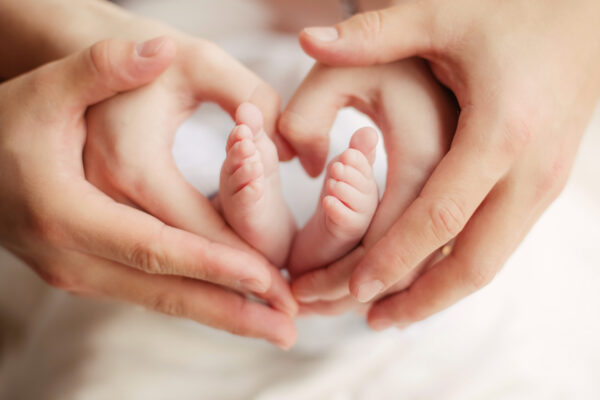Neonatal donation
Neonatal donation offers a unique opportunity for parents to establish a legacy for an infant whose life will be brief. By choosing organ and tissue donation for their infant after they have passed away, parents are deciding to save and enhance the lives of others through transplants or potentially life-saving medical research.

Neonatal donation process FAQs
Why donate?
Many people ask, ‘why donation is important?’, especially in the case of infants. Donation can directly save lives through organ and tissue transplantation. If transplantation is not possible, neonatal donation is also beneficial by allowing researchers to develop life-saving techniques, procedures and medicines. In many instances, neonatal organs produce specific enzymes which are only found in the human body for a limited amount of time. Having access to these enzymes has been key to many medical advances. Many donor parents find comfort in knowing that their baby will help save the lives of others.
Who can donate?
Donation is an incredibly rare opportunity. Expectant parents whose baby has received a fatal fetal diagnosis and will pass from natural causes during or soon after birth may have the opportunity to save the lives of others. We are grateful for your interest in donation and want to support you through the process of creating a legacy for your baby.
What can be donated?
Donation for transplant is what most people think of when they hear of organ donation. There are many factors that determine whether organs are able to be transplanted. Organs that can be donated include the heart, lungs, liver, kidneys, pancreas and intestine. In many neonatal donations, kidneys are the exclusive organs that can be transplanted due to the small size of the organs. Heart valves may also be donated as life-saving tissue.
If transplant is not an option, it may also be possible to donate organs and tissue for research that leads to cures for diseases that affect people of all ages. A few examples of past research include cardiac disease prediction, susceptibility to chronic kidney disease, developing treatment for early childhood and chronic lung disorders and working toward a cure for type 1 diabetes.
How long do I have to make a decision about donation?
Because a life-limiting diagnosis is often received well into the pregnancy, there may still be several weeks until your baby is due, and you can use that time to consider available options. LifeGift will work with you and support you throughout that decision-making process.
What steps take place prior to donation?
Once expectant parents have made an informed decision to pursue donation, LifeGift will coordinate with the family and the family’s chosen hospital care team to outline a birth plan that works for the family and will allow for donation. A representative with LifeGift will discuss and review authorization forms with you. You will need to have routine bloodwork completed and provide information on your medical and social history. As your birth plan is established and finalized, LifeGift and your hospital care team will continue to support you up until and throughout delivery.
How much time can I spend with my baby before recovery takes place?
Parents may desire to hold their baby until they pass, and even beyond. For families who choose this, it is an extremely important part of bonding with their baby. LifeGift and the family’s hospital care team need to maintain a keen awareness of the time constraints related to donation. Please remember that balancing this time span is critical to accommodate both the parent’s needs and the necessity to preserve the gift of donation. LifeGift will support you through honoring your plan and the donation process.
How does donation impact funeral/memorial service plans?
LifeGift works closely with funeral homes and mortuary services to ensure donation does not delay or affect your family’s funeral/memorial service plans.
Does the family incur any costs related to donation?
The donor family is never billed for expenses related to donation. Costs associated with recovering organs and tissue for transplantation and research are the responsibility of LifeGift. We recommend you discuss any hospital or customary labor and delivery expenses with your hospital care team, so you have clear expectations.
How does LifeGift provide support throughout the pregnancy and delivery?
LifeGift’s Family Care team is ready to provide support throughout the process. If the intention to donate is indicated earlier in the pregnancy, LifeGift will provide several points of contact to ensure your family always has someone to reach out to along with your family’s hospital care team. LifeGift will collaborate with you and your family’s hospital care team on the day of delivery until your baby passes and your baby’s gifts of donation are recovered.
After your baby is born, the hospital care team will coordinate with LifeGift team members to transport your baby to the recovery location and will stay with them until the recovery process is complete. If the family desires, LifeGift can collaborate with the hospital care team to provide memory-making opportunities. In addition, LifeGift can provide resource assistance to support siblings.
How does LifeGift provide support after the donation process?
LifeGift aims to provide the highest level of service to our donor families through our family support program. Six weeks following the donation, LifeGift provides a variety of support services which includes the outcome of your baby’s donation, grief resource materials, donor family Pathlight newsletter and participation in honoring your loved one during LifeGift’s Donor Remembrance Ceremony. Additionally, we can help facilitate connections between you and the recipients of your baby’s gift(s).
In cases where organs and/or tissue are donated for medical research, some researchers will provide outcome letters to LifeGift’s family support team which will be shared with you. LifeGift will notify you when the research studies are complete, typically about six months from the time of donation. In addition, we will provide you with feedback from studies and, to the degree possible, outcomes.
LifeGift realizes transplantation and advances in medical research would not be possible without the generosity of donor families. A family’s choice to donate is truly a selfless act. We greatly appreciate your generosity and LifeGift is here to support you and your family.
Where do I begin?
If you are considering neonatal donation and would like more information, the first step is to contact LifeGift directly or express your interest to your hospital care team. We will work closely with you and your hospital care team to explore all available options to provide a legacy for your baby through donation.
LifeGift will do everything possible to honor your family’s decision, but there is always a possibility that organ and/or tissue recovery might not be feasible for a variety of factors. Your loved one was a donor from the moment donation was authorized and will always be remembered as a donor hero. To learn more about neonatal donation, please email us at neonataldonation@lifegift.org or call 1-800-633-6562.
Have more questions? Check out our full donation FAQ page for more information.
